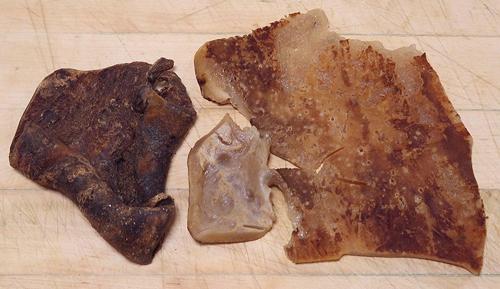 [Ponmo, Kponmo, Pomo, Awo (Nigeria); Kanda, Ngob b Nyam (Camaroon),
Kanda (Nigeria, dried)]
[Ponmo, Kponmo, Pomo, Awo (Nigeria); Kanda, Ngob b Nyam (Camaroon),
Kanda (Nigeria, dried)]
This has long been a major food item in Nigeria, to the point there is little cow hide left for making leather. It has been particularly popular with folks who couldn't afford beef meat, but it has been drifting upscale. In 2014 the government was moving to ban it so as to start a profitable tanning industry, but that resulted in near rebellion.
Dark Ponmo: The hides are roasted over an open wood fire (or sometimes burning tires or petrochemicals) and scraped to remove the hair and burned coating. They are then cut and boiled. The healthiness of Dark Ponmo depends on the fire - wood is generally a minor problem, tires and petrochemicals are a major problem. I have read a report of a processor in Lagos (the capital) being shut down for using burning tires and toxic hides intended for other purposes.
White Ponmo: The hides are scalded and then shaved. After this they are boiled until tender enough for consumption.
In either case, prepared cow skins may be let soak for some hours in water to get a light fermentation which additionally softens them.
More on Cuts of Beef.
Cow Skins have drifted upscale. They are now commonly found in restaurants as part of assorted meats dishes, or even combined with poultry, or alone, cooked with sauces like Ata DinDin.
Buying: While edible cow skins are apparently quite available in the British Isles, Nigeria having formerly been a British colony, they are not readily available in North America except as dog chews, but they can be ordered on-line from African specialty outfits. Subst: If you're not Jewish or Muslim, you could use fresh Hog Hides which are quite available. Thinner, and not the same, but similar. Meat markets serving Latin American or Caribbean communities, or even mixed ethnicities, should have plenty of those.
Cooking: Like all thick skins, Cow Skins will need a long simmer to make them swell up and be edible. The photo above shows an example as purchased (left 1.2 ounces), and after an overnight soak and 4 hours of simmering (right 4.2 ounces). the small piece shows what the cooked skin looks like on the other side.
Health and Nutrition: Ponmo, like other animal skins, contains a large amount of Collagen, which is very necessary to the human body, especially skin and joints. It's protein content is incomplete, but that isn't a problem in developed regions as there are many sources to complete the protein mix. The very severe health risks comes from processors who roast the hides over burning tires or petrochemical fires. This not only generates toxic and carcinogenic substances, but seriously pollutes the atmosphere. They also often use hides that were intended for other uses and treated with toxic chemicals.
ab_cowsknz 180607 r 220119 - www.clovegarden.com